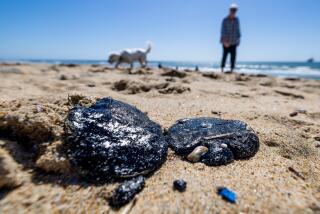Plugging Holes for Oil Spills : Pipelines: A Huntington Beach citizen sees petroleum leaking from an unearthed line and complains. The City Council has called for stricter monitoring.
- Share via
HUNTINGTON BEACH — Oil, once the biggest staple of Huntington Beach’s economy, now haunts some parts of the city like a ghost from the past.
As oil fields have been depleted, hundreds of wells have been capped. But some pipelines filled with oil residue remain hidden underground, “honeycombed in many parts of the city,” Fire Chief Raymond C. Picard said.
When underground pipes were recently unearthed by construction crews grading land for a new subdivision in the hills of western Huntington Beach, an undetermined amount of oil leaked out. That prompted one resident who witnessed the incident to complain to the city that he thought municipal ordinances for monitoring such oil spills were inadequate.
As a result, the City Council on Monday night directed Picard to draft provisions for better monitoring of inland oil spills and for testing soils afterward to make sure no contaminants remain.
Gerald Chapman, a dentist who lives in the Country View Estates subdivision in the Edwards Hill area of the city, was the resident who brought the problem to the attention during a brief speech to the council Monday night.
In an interview Tuesday, Chapman described how he stumbled upon the gaps in the city’s oil spill laws.
“One day at lunchtime, I went home for a short time, and I took a walk out to the end of the trail,” he said. “They’re building a new development near Country View Estates, and as I was watching, I saw that workmen uncovered some pipes. The old oil in the pipes started flowing as they broke open, and from the smell you could tell there was a heavy concentration of hydrocarbons.”
Chapman said he assumed the city already had a detailed procedure for monitoring such inland oil spills.
“I started calling around in the city to find out who is responsible in such things and who is supposed to be looking out for this, and I never could get a full answer,” he said.
“When a developer buys a piece of property, there is nobody in the city telling him what he has to comply with (regarding underground oil contamination). The developer is relying on the grading engineer to police this.”
Chapman said he took photos of leaky oil storage tanks and other oil contamination in various parts of the city. He presented those photos to the City Council, along with his three-minute talk about the need for better monitoring of inland oil spills.
“The city has been greatly concerned about the spill of oil on its beaches, and I wanted to make sure the city is just as concerned whenever there is an oil spill elsewhere,” Chapman said.
By coincidence, Chapman’s appearance before the City Council came on the same night that the council was giving final passage to a massive revision of the city’s oil code. The code governs oil drilling and abandonment of oil wells.
Picard, in an interview Tuesday, said the revised code provides most of the protection needed for monitoring inland oil spills, such as the rupture of old oil pipes. It also places stricter requirements on shutting down old wells.
Picard said he also is drafting a regulation to require that the hydrocarbon content of soil around an abandoned oil well be less than 100 parts per million. He noted that standard was set by the Orange County health department and was used for certifying the cleanup of the beaches after the Feb. 7 oil spill off Huntington Beach.
More to Read
Sign up for Essential California
The most important California stories and recommendations in your inbox every morning.
You may occasionally receive promotional content from the Los Angeles Times.












